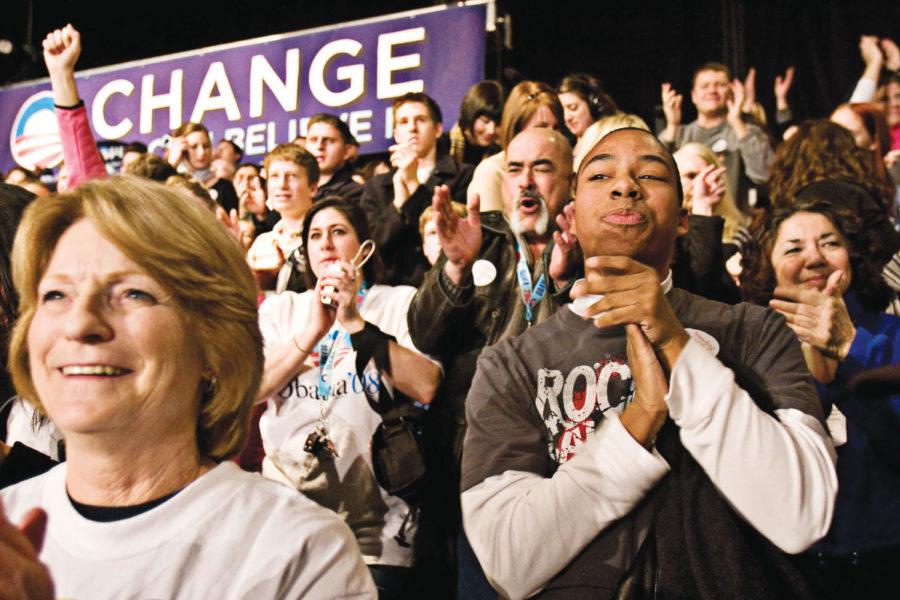Belding: Political relevance comes from asking the hard questions
Austin Locke, 18, of Des Moines, said he was “fired up” after voting for Barack Obama in his first caucus. Locke led fellow supporters in cheers before Obama’s victory speech at Hy-Vee Hall in downtown Des Moines.
June 7, 2011
Before the 2008 election, there was quite a bit of fuss about the date of Iowa’s caucuses, which are traditionally early affairs. Because of that, candidates must campaign extensively in Iowa. So when other states move their caucuses and primaries to earlier dates, candidates must pay attention to them as well. They must spread their attention and tours over several states instead of devoting their time to just one or two.
Iowa also tends to favor more conservative candidates in its caucuses. Should we choose a socially conservative candidate who does not win the Republican Party nomination, Iowa’s stature as a state able to weigh in on the ultimate quality of presidential aspirants could be damaged. If we keep choosing candidates who do not win and are unable to win, why should politicians bother visiting?
Why should we not be left out of the political process if we are only using it to insist upon one variety of conservatism?
Iowans should remember that their position is the result of good Iowa judgment, not of partisan correctness. Candidates who were favored and who went on to win did so not because of the moral, ethical or religious correctness of their positions. They did it because of their individuality: their ability to see to the heart of matters and offer working solutions agreeable to the people they were pitched to.
However enthusiastic Iowa voters may be about certain candidates, whether they be Tea Party Republicans, social conservatives, or “establishment” Republicans, their choice should rest on the most conservative candidate able to win the GOP nomination and the presidency.
Alexander Hamilton wrote that “It is easy to sacrifice the substantial interests of society by a strict adherence to ordinary rules.” It does no good to have high-minded debates during election season about ideals that cannot be realized. We exclude ourselves from post-election politics if we continually choose only the candidates we agree with instead of the candidates who can actually do the most for this country.
Iowans will preserve their position as people whose political analysis should be listened to if they ask the hard questions. It is highly disturbing, for instance, that Newt Gingrich refuses to answer what he calls “gotcha” questions — those queries from news reporters who have dug up something from his past that seems incompatible with the ideas he currently espouses.
Iowans should feel insulted at that kind of refusal. Why should difficult questions not be asked? Why should our politicians and candidates not be compelled to either explain away past sins or to reconcile seemingly conflicting beliefs? Asking those questions is not something that should be done only by the people who attend political rallies and crowd around candidates while trying to get a word in.
The hard questions should be asked by everyone who intends to vote at the Straw Poll, in the caucuses or in general election. They should be asked by everyone who plans on complaining about the direction in which this country’s policy leads us.
It is unfortunate that politicians are unwilling to have their records questioned. Apparently candidates think that they can give their speeches to cheering audiences, one after another, and wait for the public’s verdict, without being held to any standard — including the one established by their past statements. In making us choose before talking about anything, before holding a dialogue on the issue that is not simply an exchange of talking points, we grant free reign to the polarization of America. Gingrich and all the rest should want to be president of all Americans, not only those who elected them.
Every politician should understand that “there is not a liberal America and a conservative America — there is the United States of America.” “E pluribus unum” is emblazoned across our money and serves as our national motto for a reason. The phrase is what our country, Constitution and all, is supposed to be about: “Out of many, one.”
Stifling people during a political campaign just because their questions ask for a reconciliation of past and present is wrong.







